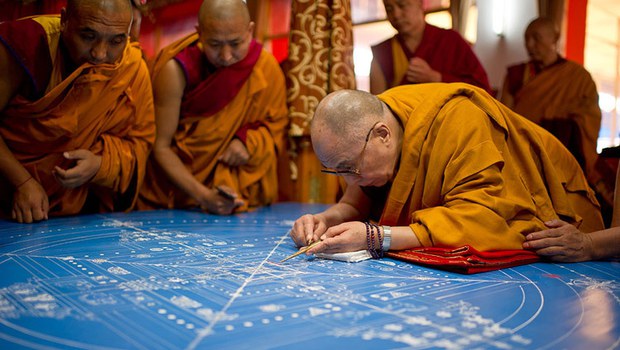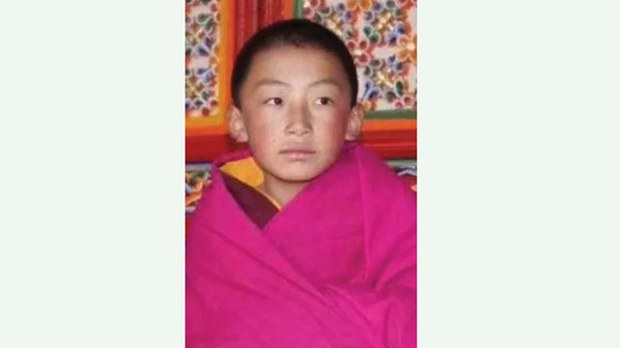China bars Tibetans from attending Buddhist Kalachakra sermon
Share

His Holiness the Dalai Lama placing the first grains of colored sand to start the construction of the Kalachakra sand mandala during the 32nd Kalachakra Empowerment in Bodhgaya, Bihar, India on January 1, 2012.
Chinese authorities have barred Tibetans from attending a key Buddhist event called the Kalachakra out of fear that the gathering of more than 100,000 people could pose a threat to the government, according to Tibetans in the region.
The move to control access to the Sept. 15-17 sermon by prominent lama Gungthang Rinpoche Lobsang Jamyang Geleg Tenpe Khenchen in Gansu province’s Gannan Tibetan Autonomous Prefecture comes amid growing criticism of China’s policies in Tibet, where authorities restrict Tibetans’ political activities and peaceful expression of cultural and religious identity.
In a Sept. 10 directive obtained by RFA Tibetan, authorities in Dzoege county – a part of Tibet’s historical eastern region of Amdo – said the sermon “is only arranged for residents of [the city of] Tsoe (in Chinese, Hezuo)” and that there “are no arrangements made for Tibetan devotees coming to attend from other parts of Tibet.”
“To maintain the religious activities pertaining to Kalakchakra in order, and to keep everything in control including crowd and traffic, non-resident Tibetans will not be allowed to go near the teaching site,” the directive said. “Those [non-residents] who have already arrived are instructed to leave the premises.”
The Kalachakra, which means “infinite wheel of time” in Sanskrit, is a sacred event where key Buddhist teachings are passed on to devotees. Only a very few qualified Tibetan Buddhist masters, including exiled Tibetan spiritual leader the Dalai Lama, can deliver such sermons.
A Tibetan in the region said that the sheer size of the audience for the Kalachakra had prompted authorities to restrict access to the event.
“The Chinese authorities have barred Tibetans coming from other parts of Tibet from attending the teaching because they are fearful of such huge gatherings and are being cautious of possible demonstrations against the Chinese government, said the Tibetan who, like others RFA interviewed for this report, spoke on condition of anonymity, citing fear of reprisal.
“More than 100,000 Tibetan devotees have gathered for this Kalachakra but, besides residents, Tibetans coming from Qinghai, Sichuan and other parts of the region are not allowed to attend.”
Directive removed from website
The Gungthang Rinpoche is an influential religious figure from the Labrang Tashikyil Monastery in Gansu’s Xiahe county. In 2004, he was recognized as the seventh reincarnation of the Gungthang Rinpoche by the sixth one, Jamyang Zhepa.

The directive follows the earlier canceling of the Kalachakra in July when, despite obtaining permission from authorities, organizers were told they could not hold the event because it conflicted with the 70th anniversary of the establishment of Gannan prefecture.
Tibetans frequently complain of discrimination and human rights abuses by Chinese authorities and policies they say are aimed at eradicating their national and cultural identity.
Barring non-residents from Friday’s teaching due to security concerns has also made authorities the target of their anger, sources said.
On Thursday, the Propaganda Department of the Communist Party of Hezuo City, which had originally posted the directive, appeared to have removed it from their website, with no explanation given.
Another Tibetan source told RFA that authorities may have felt helpless in the face of devotees “pouring” into the region for the Kalachakra.
“The authorities have not been able to control and restrict them as per their directive,” he said. “There are more than 100,000 devotees … who have come to attend the teaching and, in order to avoid any sort of conflict and commotion, I think that the government is now giving up on it.”
Translated by Tenzin Dickyi for RFA Tibet. Edited by Joshua Lipes and Malcolm Foster.







